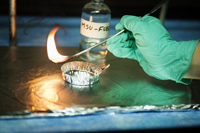Biofuels research and development activities have increased significantly over the past two years. The Department of Energy (DoE), the Department of Defense (DoD), the National Science Foundation (NSF), and numerous state agencies have carefully evaluated technologies and awarded funds (Resource Conservation and Recovery Act) to promising technologies that may considerably contribute to an increase in capacity, production, and distribution of renewable fuels.
About the Biofuels Conference
 Biofuels
research and development activities have increased significantly over the past
two years. The Department of Energy (DoE), the Department of Defense (DoD), the
National Science Foundation (NSF), and numerous state agencies have carefully
evaluated technologies and awarded funds (Resource Conservation and Recovery
Act) to promising technologies that may considerably contribute to an increase
in capacity, production, and distribution of renewable fuels.
Biofuels
research and development activities have increased significantly over the past
two years. The Department of Energy (DoE), the Department of Defense (DoD), the
National Science Foundation (NSF), and numerous state agencies have carefully
evaluated technologies and awarded funds (Resource Conservation and Recovery
Act) to promising technologies that may considerably contribute to an increase
in capacity, production, and distribution of renewable fuels.
Experts in the biofuels area have recognized that the science and engineering foundation of the next generation of biofuels is based on application of molecular biology as a way of optimizing feedstock/fuels generated by microorganisms, development of novel extraction/reaction technologies, discovery of new and robust catalysts for conversion of lignocellulose into feedstocks/fuels, and novel strategies to manage feedstock/biofuel quality, logistics, and integration into current fuel production/distribution infrastructure. Some of the most promising biofuel technologies include algae biodiesel/renewable diesel, extraction of energy from wastewater treatment operations, and conversion of lignocellulose into fuels using thermochemical or sugar fermentation platforms.
At the 2014 Mississippi State University Biofuels Conference, international and national researchers and experts from industry and academia will discuss their progress on the science and engineering fundamentals, and the challenges with each of these technologies associated with scale-up, regulatory compliance, negotiations with stakeholders, feedstock logistics, and fuel distribution.
The invited speakers will discuss the state of the next generation of biofuels and progress toward commercialization. On the first day of the conference, August 12, experts on biofuels will discuss the latest information on (1) costs and availability of feedstocks, (2) strategies being developed by states and industry to deliver feedstocks to biofuel facilities, (3) costs, markets, and sustainability of algae and microbial oils, bio-oil, and lignocellulosic ethanol and gasoline, (4) chain supply economics and strategies for optimum locations of biofuel facilities, and (5) life-cycle analysis of technologies. Attendees will also have an opportunity to interact with future engineers and scientists developing new technologies for the next generation of biofuels via student poster presentations/competition that evening. On the second day, August 13, biofuels companies will discuss the challenges of commercialization: (1) establishing new markets for biofuels, (2) transitioning from bench to pilot scale, (3) meeting the required fuel standards, (4) impact of future legislation on the market, and (5) economics.
© 2014 Mississippi State BioFuels Conference
http://www.biofuelsconference.msstate.edu/
